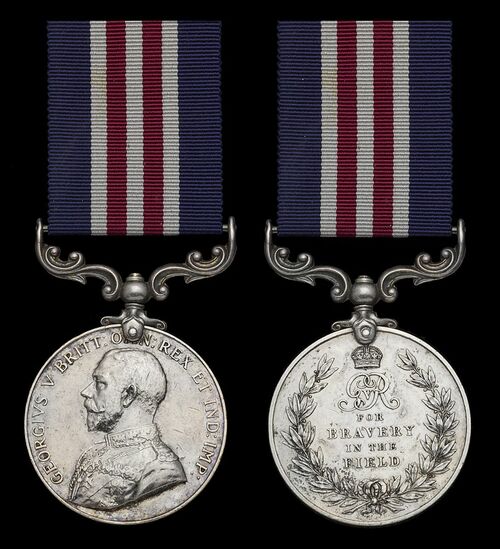
Auction: 24001 - Orders, Decorations and Medals
Lot: 192
(x) The remarkable Passchendaele M.M. awarded to Sergeant P. Brophy who was additionally awarded the D.C.M. for his service in saving the Daily Express building during the Easter Uprising in Dublin on 25 April 1916
Military Medal, G.V.R. (4907 Sjt: P. Brophy. 1/R.D.Fus.), light contact marks, very fine
[D.C.M.] London Gazette 24 January 1917, the original citation states:
'For conspicuous gallantry and devotion to duty. He assisted to establish a permanent footing in the upper stories of a building under heavy fire. He set a splendid example to his men.'
M.M. London Gazette 18 October 1917.
Peter Byers alias Brophy, was born at St. Mary, Donnybrook, Dublin in 1881. Attesting first with the 5th (Reserve) Battalion, Royal Dublin Fusiliers in 1902 he served until 21 June 1908 before joining the Special Reserve. While with them he undertook a stretcher bearing course in March 1911, briefly promoted he soon reverted back to Private. Mobilised for action with this unit on 6 August 1914 Brophy was advanced Sergeant the next year on 3 February 1915.
The unit remained in Ireland for the first years of the Great War and it was in Brophy's native Dublin that he was to first see action, during the Easter Rising. He was part of the 5th Battalion detachment which defended Dublin Castle initially before counter attacking against the Daily Express offices, fortified by the Citizen Army. The action is described in the 1916 Rebellion Handbook, which states:
'‘All available forces of the Crown had been engaged throughout Tuesday morning in conflict with the entrenched rebels, and many fiercely-contested engagements took place. At daybreak a body of Crown troops surrounded Cork Hill, and a fierce struggle took place for the possession of the Daily Express building. Artillery was brought into play, and prepared the way for a charge. This was carried out in gallant style by a detachment of the 5th Royal Dublin Fusiliers, under Second Lieutenant F. O’Neill, and a terrible fight took place on the only staircase leading to the upper rooms. Many casualties took place at this stage; however, the Crown forces ultimately carried the position, and either killed or captured the rebel garrison.’
It was for his part in this attack that Brophy was awarded the D.C.M., when the troops finally seized the top floor of the building, leaving 22 defenders dead. He was not to remain in Ireland however and soon entered the war in France on 8 April 1917, According to their Lights by Neil Fergusson goes into detail upon his later career stating:
''Brophy later entered the war when he landed in France in April 1917 to join the 1st Dublin Fusiliers in the trenches. It was not long before he suffered his first injury, although it was a minor one. On 4 July 1917, as a report later stated, when getting out of the train when returning from a Court Martial, a box of bully beef fell on his hand and bruised it. He was in no way to blame." He did not serve with this battalion for the rest of the war: he left it in August 1917 but not before he earned himself another medal for bravery. In the regimental orders issued by the commanding officer of the 1st Royal Dublin Fusiliers for 28 August 1917 it was announced that Sergeant Peter Brophy had been awarded the Military Medal.'
At this time the Battalion was engaged in the Battle of Passchendeale, being stationed near Frezenberg ridge. They had suffered appalling casualties in the heavy fighting with the 48th Brigade losing 82 officers and over 1,500 men on 17 August alone. It is likely for the fighting around Ypres that Brophy was awarded his Military Medal.
However he was soon hospitalised again, this time with bronchitis and his health clearly remained a concern as he transferred to the Labour Corps with the number 426261. Brophy was must have been determined to return to action however and managed to transfer one final time, joining 17th Battalion, Royal Sussex Regiment on 15 June 1918. The next day the unit was redesignated a service Battalion and Brohpy was promoted Company Sergeant Major on 25 June. According to their Lights closes out his story, stating:
'The war was nearly over, and even though he had fought during the Rising and had been in France for nearly a year and a half Brophy had never been wounded by enemy fire. This all changed on 6 October 1918 when he received a gunshot wound to his left forearm. His file records that it was a bullet from a machine gun that hit him, that his radius (one of the bones of the forearm) was fractured, and that a fragment of bone had to be removed. He survived and was soon on his way to the Northumberland War Hospital in Gosforth in Newcastle-upon-Tyne, where a metal plate was attached to the broken bone in his arm. In time he was transferred to the Red Cross Hospital in Dublin Castle to recover - the very place he had helped to defend and from where the assault against the Daily Express offices was launched in April 1916.
Peter Brophy was finally discharged in May 1919 - no aged thirty-seven - and returned to live with his family in his native Donnybrook.'
Sold together with copied research including service papers and an extract from According to their Lights
Further entitled to the Distinguished Conduct Medal and a British War and Victory Medal pair.
The D.C.M. last known to the market in 2019.
Subject to 5% tax on Hammer Price in addition to 20% VAT on Buyer’s Premium.
Sold for
£2,000
Starting price
£270




